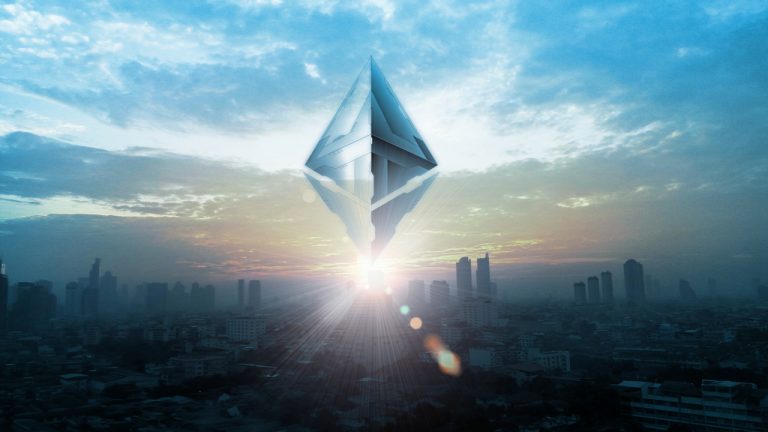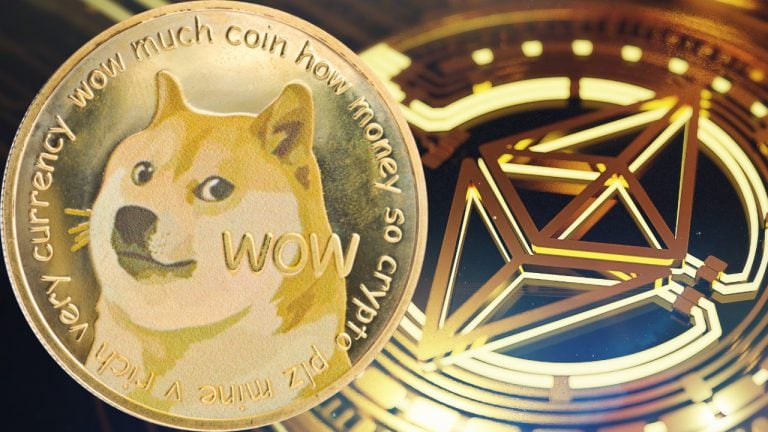 A documentary project called “Ethereum: The Infinite Garden” has raised 1,036 ether to complete its fundraising proposal. The project will use these funds to finance the first feature-length Ethereum documentary, that will cast members from the community and key individuals from the Ethereum Foundation, including Ethereum co-founder Vitalik Buterin. The initiative aims for a 2023 […]
A documentary project called “Ethereum: The Infinite Garden” has raised 1,036 ether to complete its fundraising proposal. The project will use these funds to finance the first feature-length Ethereum documentary, that will cast members from the community and key individuals from the Ethereum Foundation, including Ethereum co-founder Vitalik Buterin. The initiative aims for a 2023 […]
Slated to premiere in winter 2023, the film will approach Ethereum as an “infinite garden,” laying out its blockchain as a “decentralized ecosystem with soil, plants, and insects.”
The cryptocurrency community is highly anticipating the release of a new documentary about the Ethereum blockchain, with the film’s funding campaign exceeding expectations.
A crowdfunding round for Ethereum-themed documentary dubbed Ethereum: The Infinite Garden has surpassed its goal of 750 Ether (ETH), raising a total of 1,035.96 ETH worth $1.9 million as of July 16, the creators announced.
And that’s a wrap. 984.16 ETH raised for the film. 31.08 ETH to @gitcoin grants. 20.72 ETH to @Carbonfundorg. THANK YOU to everyone who supported, and congratulations to our new producers. Now let’s go make a movie! See the complete set of credits here: https://t.co/qOcezAOj4R pic.twitter.com/1K6fVEGaO8
— Ethereum: The Infinite Garden (@EthereumFilm) July 16, 2021
The funding campaign started last Wednesday to support the production of a feature-length character-driven documentary film exploring the “innovative real-world applications of the Ethereum blockchain, the die-hard community of enthusiasts and developers, and its creator, Vitalik Buterin.”
Ending Friday, the fundraising campaign amassed a total of 662 backers that contributed through Mirror, a decentralized crypto-based network. “We are blown away by the support of the community. In 3 days we surpassed our goal,” the project creators said.
Some 95% of raised funds will be directed towards the film’s production budget, while 3% will be distributed on Gitcoin grants to support open-source Ethereum projects, and the remaining 2% will be sent as a donation to Carbonfund.org, an initiative to reduce global carbon emissions.
Related: Maximalists at the movies: Bitcoiners crowdfunding anti-FUD documentary film
To premiere in winter 2023, the film will approach Ethereum as an “infinite garden,” laying out its blockchain as a “decentralized ecosystem with soil, plants, and insects” instead of thinking of it as a “machine controlled by a central brain.” The idea of the infinite garden was conceptualized by Aya Miyaguchi, the executive director of the Ethereum Foundation.
The project creators dropped a series of Infinite Garden nonfungible tokens (NFTs) tied to select on-screen credits in the film. The top three backers have been awarded these three unique NFTs designed by digital artist Pplpleasr, who is known for providing visual work for films like Batman v Superman, Wonder Woman and Star Trek Beyond.
 Save the Children in Rwanda recently became the latest member of the NGO community to endorse cryptocurrencies after it announced the establishment of a partnership agreement with the Cardano Foundation. ADA Donations According to a statement released by parties to the project, this arrangement became possible after Cardano “installed a payment gateway that allows ADA […]
Save the Children in Rwanda recently became the latest member of the NGO community to endorse cryptocurrencies after it announced the establishment of a partnership agreement with the Cardano Foundation. ADA Donations According to a statement released by parties to the project, this arrangement became possible after Cardano “installed a payment gateway that allows ADA […] Just recently, a software developer and “Solidity nerd” called Bunny Girl has sparked heated conversations within the cryptocurrency community over a smart contract that reveals a process called a “Request For Reorg contract (RFR).” On Twitter, Bunny Girl explained that the contract “creates a mechanism that allows users to pay miners to reorg the Ethereum […]
Just recently, a software developer and “Solidity nerd” called Bunny Girl has sparked heated conversations within the cryptocurrency community over a smart contract that reveals a process called a “Request For Reorg contract (RFR).” On Twitter, Bunny Girl explained that the contract “creates a mechanism that allows users to pay miners to reorg the Ethereum […]
Ethereum might be the darling of the blockchain world, but it’s likely that the awaited Eth2 will not attract wider mainstream adoption.
Ethereum 2.0 (Eth2) is being pegged as the blockchain Messiah of Ethereum. Newsflash: it's not. The long-awaited changes are not expected to solve core issues that are plaguing the network and forestalling wider adoption.
Vitalik Buterin, the brilliant mastermind behind the Ethereum blockchain, considers the personnel working with Ethereum as a bigger problem than the actual software, as he stated in a recent interview with Forkast news. While the personnel working on the project may or may not be problematic, it's surely not the only shortcoming. As promising as the new rollout may seem, the kind of software upgrades set to be introduced will not solve the long-term problems plaguing the network from reaching the heights Buterin and his disciples once envisioned.
Related: The great tech exodus: The Ethereum blockchain is the new San Francisco
Ethereum currently runs on a proof-of-work (PoW) system that enables only up to 15 transactions per second or so — double that of the Bitcoin (BTC) blockchain — and is widely considered as impractical for building any expansive decentralized finance, or DeFi, ecosystem. As a result, gas fees are incredibly high on Ethereum. Because so few transactions can be processed per second, the price to process faster becomes competitive. Research by Dune Analytics shows that 2-5% of transactions on Ethereum-based decentralized exchanges (DEXs) failed due to complications such as insufficient gas prices.
Related: Ethereum fees are skyrocketing — But traders have alternatives
Another core issue the Ethereum platform faces, but often disregards, is poor user experience (UX) design. As a result, the average users who may be interested in engaging with decentralized finance applications (DApp) or a nonfungible token (NFT) marketplace, for example, will avoid doing so because most user interfaces are not only not intuitive, but also lack sufficient educational resources to give users the know-how to use the platform.
Users are expected to set transaction fees in gas price and gas limits for transaction processing. Yet, how many users realistically know this without going down the intense rabbit hole of cryptocurrency jargon and information? Insider Intelligence reported that 25% of United States adults don’t understand or know how to invest in digital currencies. How could users be expected to know without access to effective educational tools, for example, that sending payment from two separate wallets to the same receiving address would not cause a nonces conflict? In all likelihood, the vast majority of regular users would not be aware in the slightest of such a problem to begin with.
Related: Mass adoption of blockchain tech is possible, and education is the key
To respond to these long-standing issues, Ethereum's overseers announced the launch of Eth2 as a series of upgrades over its existing model, which would include switching to proof-of-stake (PoS) and sharding. The proof-of-stake concept states that people can mine blocks and validate transactions according to how many coins they hold. The Ethereum Foundation announced that it expects the switch to PoS to be completed by the end of 2021. As the Ethereum Foundation explained in a recent blog post, “the energy requirements remain unchanged” compared with the old PoW system.
Related: When will Ethereum 2.0 fully launch? Roadmap promises speed, but history says otherwise
Sharding is expected to take much longer and, according to Ethereum’s website, “shard chains could ship sometime in 2022 depending on how quickly work progresses” after the current Ethereum mainnet merges together with the Beacon Chain proof-of-stake system. Sharding is the process of splitting a database horizontally in order to spread the load, reducing network congestion and increasing transactions per second. The shard chains are expected to give Ethereum more capacity to store and access data.
The new upgrades are designed to be more environmentally conscious and speed up the processing of transactions. In addition to these upgrades, the blockchain programming language is expected to change from the traditional Ethereum Virtual Machine (EVM) to one that can be adopted by developers using C++ or Rust, which will simplify coding directly into a browser. While the infrastructural upgrades may prove beneficial in some capacities, such as improving the flow of transactions, they still miss the mark.
First, Ethereum 2.0 has been in the works for years, leaving many users wondering when the actual full upgrades will happen. Proof-of-stake is intended to reduce mining cost and energy consumption, however, network throughput will only increase if block times are reduced and/or block sizes are increased. Furthermore, sharding only helps applications that can run independently from one another and only need to be synced every once in a while. But DeFi's inherent decentralized and open-sourced nature means that the sharding-style processing would need to run transactions through a relay chain and thus slow down the entire process.
Related: Where does the future of DeFi belong: Ethereum or Bitcoin? Experts answer
More importantly, on the user experience front, Ethereum is still lagging behind to a large extent that remains unsolved by the rollout of the Eth2 upgrade. While Ethereum claims it will release upgrades that solve the transaction processing speeds and high gas fee problem to a degree, the foundation shows a blatant disregard for issues that, if resolved, would open doors for a greater number of users who are currently daunted by Ethereum’s unfriendly interface.
Even when the expected upgrades will eventually roll out, users will still have difficulty setting transaction fees in gas prices and gas limits for transaction processing. Even beyond Ethereum, the UX issues are not unique to Ethereum and are common on other blockchains that use EVM protocols, such as Binance Smart Chain and Polygon. Because other Ethereum-compatible chains that use EVM protocol suffer from the same UX issues, it is difficult to envision a future in which even EVM-based chains will also be truly accessible to the average user.
In addition to the lingering gas fee parameter issues, transactions have long confirmation times that typically result in delays, asynchronous transaction submission and confirmation notices. Quite often a user will not receive confirmation right after the transaction, leaving too much uncertainty regarding whether the targeted recipient received the transaction. For users who are accustomed to instantaneous results on the web, like e-commerce situations, this is a strange and frustrating user experience.
Ethereum might be the darling of the blockchain world, but at some point, the hype may just turn out to be hot air, and it’s very likely that the long-awaited upgrade will not attract wider mainstream adoption. It’s not clear if the expected changes will be able to deliver the promises of the Ethereum Foundation's head honchos. Until Ethereum can solve some of the deeper issues at heart, it's doubtful that Eth2 will make a significant difference for anyone outside of the community of Ethereum enthusiasts. For now, Ethereum 2.0 is not a much-needed game-changer, but rather a cosmetic upgrade.
This article does not contain investment advice or recommendations. Every investment and trading move involves risk, and readers should conduct their own research when making a decision.
The views, thoughts and opinions expressed here are the author’s alone and do not necessarily reflect or represent the views and opinions of Cointelegraph.

The Bitcoin Water Trust has already received more than $1.3 million worth of BTC donations despite launching just three weeks ago.
New York-based non-profit, Charity: water, has received more than $1 million in BTC donations to its Bitcoin Water Trust within three weeks of the trust's launch.
The Bitcoin Water Trust was announced during the 2021 Bitcoin conference in Miami. The initiative attracted attention for its “HODL MODL” treasury management strategy — with the non-profit accepting donations in Bitcoin that it will not touch until 2025.
According to the charity’s website, a total of 32.5949 BTC has been donated so far, which equates to more than $1.3 million at current prices.
The charity is hoping to leverage the hypothetical gains Bitcoin could make over the coming years. A June 14 blog post from U.S.-based crypto exchange Gemini — which is providing crypto custody services for the trust — asserts that donations received by the charity today could have a much larger impact if held into the future:
“This new charity model — the HODL MODL — creates a new paradigm for charitable giving. It brings the HODL ethos of Bitcoin to charitable giving, and means your bitcoin donation today could make an even bigger impact tomorrow.”
Gemini’s founders, Tyler and Cameron Winklevoss have also agreed to match the first 50 Bitcoin donated to the Bitcoin Water Trust.
“We’re thrilled to help a fellow mission-driven organization like Charity: water accept bitcoin and maximize its humanitarian efforts,” the post added.
Charity: water was founded in 2006, with the non-profi working to launch community-owned water projects that provide clean water and sanitation to developing nations. The organization first began accepting Bitcoin donations in 2014.
Related: The rise of crypto charities: Elongate and Munch raise millions for various causes.
Charity has become a popular topic within the crypto industry in recent months after Ethereum co-founder Vitalik Buterin donated billions worth of SHIB tokens that had been airdropped to his wallet by the meme-coin’s creators.
Buterin donated one-tenth of his SHIB holdings to charity after burning the remaining 90% to deter other altcoin developers from airdropping massive quantities of their token’s supply to his wallets for promotion. The India Covid Relief Fund was among the top recipients of Buterin’s dog-token stash, receiving more than $1 billion worth of SHIB.
On May 31, the Human Rights Foundation (HRF) — an organization that supports human rights activism globally — launched several Bitcoin-based grants as part of its $210,000 Bitcoin Development fund.

Ethereum founder Vitalik Buterin says that Cardano (ADA), the fifth-largest cryptocurrency, is introducing fresh ideas to the crypto space. In an interview with artificial intelligence researcher Lex Fridman, Buterin observes that “interesting things” have originated from IOHK (Input Output Hong Kong) – the blockchain research firm associated with Cardano founder, Charles Hoskinson. “There’s definitely interesting […]
The post Cardano Bringing Interesting Ideas to Crypto, Says Ethereum Creator Vitalik Buterin appeared first on The Daily Hodl.
 Tesla CEO Elon Musk said he “pretty much” agrees with Ethereum co-founder Vitalik Buterin about a collaboration between Dogecoin and Ethereum. Buterin said: “if we can have a secure Doge-to-Ethereum bridge. That would be amazing.” Vitalik Buterin Talks About Dogecoin and Ethereum Bridge, Elon Musk Agrees Ethereum co-founder Vitalik Buterin talked about a potential collaboration […]
Tesla CEO Elon Musk said he “pretty much” agrees with Ethereum co-founder Vitalik Buterin about a collaboration between Dogecoin and Ethereum. Buterin said: “if we can have a secure Doge-to-Ethereum bridge. That would be amazing.” Vitalik Buterin Talks About Dogecoin and Ethereum Bridge, Elon Musk Agrees Ethereum co-founder Vitalik Buterin talked about a potential collaboration […] The cofounder of Ethereum, Vitalik Buterin, recently discussed the highly anticipated full transition from a proof-of-work (PoW) consensus model to proof-of-stake (PoS) as its replacement. Buterin admitted at Hong Kong’s Startmeup HK 2021 Festival that the transition was taking too long and highlighted that it wasn’t technical problems but “related to people.” Buterin: ‘If You […]
The cofounder of Ethereum, Vitalik Buterin, recently discussed the highly anticipated full transition from a proof-of-work (PoW) consensus model to proof-of-stake (PoS) as its replacement. Buterin admitted at Hong Kong’s Startmeup HK 2021 Festival that the transition was taking too long and highlighted that it wasn’t technical problems but “related to people.” Buterin: ‘If You […]